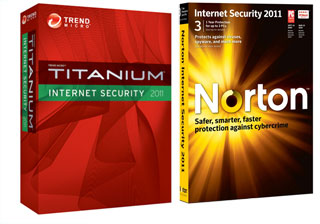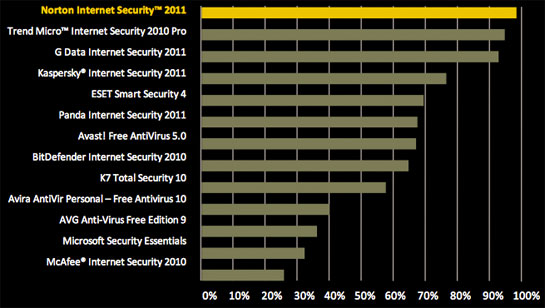Norton and Trend Micro Promise Less Stressful Security
By Harry McCracken | Wednesday, September 8, 2010 at 3:44 am
 One of the biggest burdens of being a Windows user is the responsibility of protecting yourself against viruses, spyware, and other threats–attacks which increasingly aim to steal personal information and money rather than just annoy you. And one of the biggest burdens of protecting yourself from these attacks has been the degree to which security software can be problematic itself. Symantec and Trend Micro are both announcing new versions of their software today with a focus on providing security that you can welcome onto your computer–and, better yet, largely ignore once it’s there–rather than stress over.
One of the biggest burdens of being a Windows user is the responsibility of protecting yourself against viruses, spyware, and other threats–attacks which increasingly aim to steal personal information and money rather than just annoy you. And one of the biggest burdens of protecting yourself from these attacks has been the degree to which security software can be problematic itself. Symantec and Trend Micro are both announcing new versions of their software today with a focus on providing security that you can welcome onto your computer–and, better yet, largely ignore once it’s there–rather than stress over.
Symantec’s Norton products once had particularly bad reputations for being a resource-sapping, in-your-face hogs. The company has spent the past couple of years paying penance by reducing the load that new versions put on your system and the demands they place on your attention. It says that its 2011 editions are faster than both their predecessors and its competition, and that it’s reduced the number of alerts they’ll bother you with. They also snitch on other programs, via System Insight, a feature that monitors running applications and identifies ones which may be bogging you down.
As before, Norton uses community-based reputation–judging files in part by whether other Norton users have downloaded them without problems. Other new features include protection against dangerous downloads that works in a comprehensive range of browsers, IM clients, and e-mail programs; and the ability to manage other browser-based Norton services (Norton Online Backup and Norton Online Family) from within the Norton dashboard. And the Norton Bootable Recovery Tool now lets you easily prepare a CD-ROM, DVD, or USB drive to undo damage to computers so crippled by an attack that they can’t even start up.
Norton 2011 is available in two versions. Plain-jane AntiVirus 2011 costs $39.99 for a version that covers one PC for one year. Norton Internet Security, which adds a firewall, antispam, parental controls, identity protection, and other features, is $69.99 for up to three PCs.
Symantec is also touting several free security downloads it offers, including Power Eraser, which is designed to detect and remove “scareware” that’s often maddeningly difficult to shake, such as malware which poses as real antivirus software.
Trend Micro, meanwhile, has given its security products a new name: Titanium. More important, it’s given them a new approach: Instead of making you download signatures to your PC to detect viruses and other dangers, it’s put most of the detecting (including its own version of community-based file analysis) in the cloud and aimed to prevent dangerous files from ever reaching computers in the first place. The company says that this dramatically reduces required resources. (The software does include features to detect and fix problems that happen when you’re offline.)
As with Norton 2011, the goal may be to be unobtrusive, but there’s a lot of information and settings if you want them:
This cloud-based strategy, Trend says, is particularly effective against zero-day attacks–ones so new that security companies haven’t created and distributed fixes for them.
Trend’s basic package, Titanium Antivirus+, is $39.95 for one PC or $59.95 for three. Titanium Internet Security adds antispam, parental controls, and other features for $49.95 for one PC or $69.95 for three machines. And Titanium Maximum Security tops that off with 10GB of online backup, system optimization, a secure erase utility, and other features for $59.95 for one PC or $79.95 for three. Unlike Norton, Trend doesn’t include a firewall with any of its versions, choosing instead to integrate with the one built into Windows.
I’ve been trying both Norton and Titanium this week and found them better behaved than security products of the past, including both company’s own past efforts. But this article isn’t a review–the biggest question about any security package is still how well it protects you from threats, and I’m not in a position to judge that.
For what it’s worth, both companies have commissioned well-known third-party testing organizations to put their products through their paces. You probably won’t be shocked to learn that all the results make the products of the commissioning company look good.
Here, for instance, is Norton using benchmarks by AV-Test.org to show that NIS is the most effective malware fighter:
And here’s Trend Micro’s chart based on tests by NSS Labs that show it catching the most threats before they execute on a PC:
Of course, there’s nothing fundamentally conflicting about the two companies’ charts: They’re reporting on different tests, and neither company’s tests include the other one’s brand-new version. I’ll be curious to see what conclusions PCWorld, PCMag.com, and other independent sites come to when they compare these and other 2011 versions.
So what security software do you run, Windows users–and how happy (or unhappy) a camper are you?
4 Comments
Read more:

















September 8th, 2010 at 7:25 am
"Norton and Trend Micro Promise Less Stressful Security"
Yes. They include a free copy of Mac OS X to run on your personal computer.
Simple.
September 8th, 2010 at 9:28 am
Sunbelt VIPRE antivirus.. Very lightweight and very efficient. Came to this conclusion about a year and a half ago when benchtesting all the big names, VIPRE was the only one that consistently stopped malware before it was executed.
September 8th, 2010 at 9:42 am
Out of all the products i see on workstations of the people who think i can fix their computer, Trend and Kaspersky seem to do the best work. McAfee and Symantec are far behind IMHO
September 9th, 2010 at 12:19 pm
Strealaoz, I'm not trying to be condescending, but you should probably speak to a psychiatric professional about symptoms of schizophrenia.